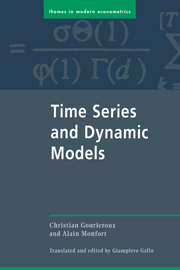Book contents
- Frontmatter
- Contents
- List of Adopted Notations
- Preface
- Chapter 1 Introduction
- Part I Traditional Methods
- Part II Probabilistic and Statistical Properties of Stationary Processes
- Part III Time-series Econometrics: Stationary and Nonstationary Models
- Chapter 10 Causality, Exogeneity, and Shocks
- Chapter 11 Trend Components
- Chapter 12 Expectations
- Chapter 13 Specification Analysis
- Chapter 14 Statistical Properties of Nonstationary Processes
- Part IV State-space Models
- References
- Tables
- Index
Chapter 12 - Expectations
Published online by Cambridge University Press: 30 January 2010
- Frontmatter
- Contents
- List of Adopted Notations
- Preface
- Chapter 1 Introduction
- Part I Traditional Methods
- Part II Probabilistic and Statistical Properties of Stationary Processes
- Part III Time-series Econometrics: Stationary and Nonstationary Models
- Chapter 10 Causality, Exogeneity, and Shocks
- Chapter 11 Trend Components
- Chapter 12 Expectations
- Chapter 13 Specification Analysis
- Chapter 14 Statistical Properties of Nonstationary Processes
- Part IV State-space Models
- References
- Tables
- Index
Summary
Most of the models and results described in the previous chapters are based on the notion of an optimal forecast of a variable given its past. For example, this notion has been useful to define the autoregressive form of a process, its innovation, and so on, but also to analyze in greater details the links between processes (partial correlation, causality measurement, etc.) or to develop estimation methods (maximum likelihood in conditional form).
In this chapter we are interested in a more practical aspect of this optimal forecast.
Economic agents, e.g., firms, financial operators, consumers, must in general decide their current behavior taking into consideration the ideas they have about the future. Since this future is partially unknown, they have to forecast it in a proper way. This leads us to study two questions which are linked to each other:
(i) How do agents foresee their future?
(ii) How do their expectations influence their current behavior?
In the first section we will start by recalling a number of results on forecasts which have been introduced in the previous chapters. We will treat the updating problem in great detail and specify the economic terminology which is slightly different from the probabilistic terminology used up to now.
The other sections are all related to the analysis of explanatory models containing expectations among the explanatory variables. More precisely, we will look at the properties of these models in the case of optimal expectations (or rational in the economic terminology).
- Type
- Chapter
- Information
- Time Series and Dynamic Models , pp. 455 - 493Publisher: Cambridge University PressPrint publication year: 1996
- 2
- Cited by



